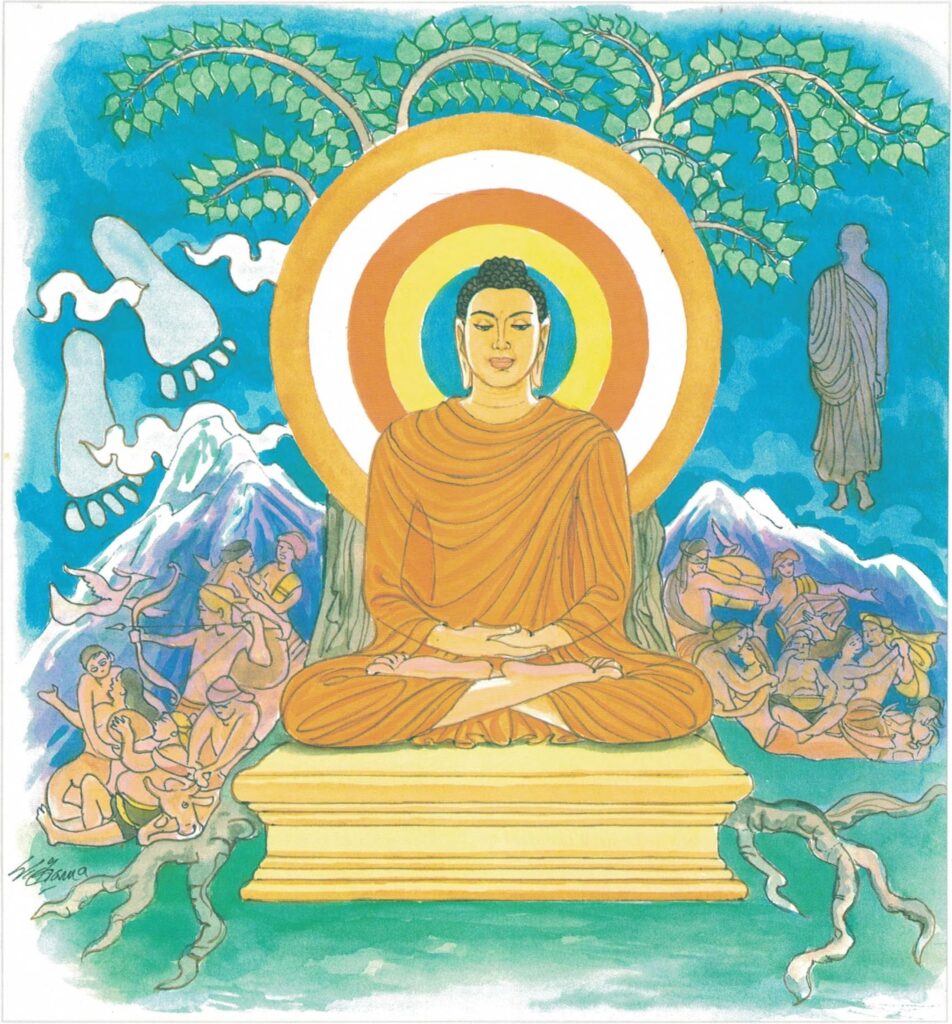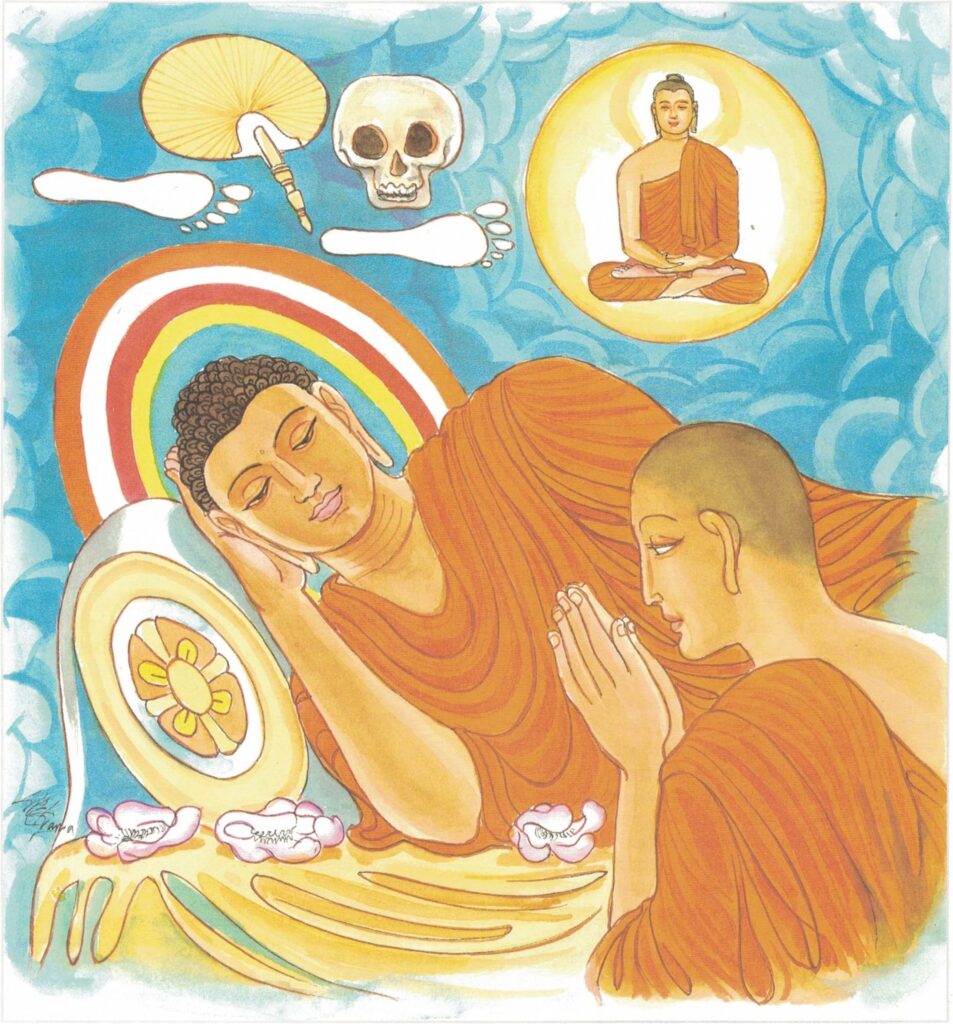Pali text, illustration and English translation of Dhammapada verse 254-255:
ākāse padaṃ natthi samaṇo natthi bāhire |
papañcābhiratā pajā nippapañcā tathāgatā || 254 ||
ākāse padaṃ natthi samaṇo natthi bāhire |
saṅkhārā sassatā natthi natthi buddhānamiñjitaṃ || 255 ||
254. In skies above there is no path, no peaceful one’s without, in manifoldness do folk delight, Tathagatas are manifold-free.
255. In skies above there is no path, no peaceful one’s without, nothing conditioned ever lasts, no Buddha’s ever shaken.


The Story of Subhadda the Wandering Ascetic
While residing at the Sal Forest of the Mallās at Upavattana in the city of Kusinārā, the Buddha spoke these verses just before Parinibbāna (The Great Demise) in reply to the question raised by Subhadda the wandering ascetic.
The story goes that in times long past, when Subhadda’s younger brother gave alms, nine times, of the first-fruits of a certain crop, Subhadda himself had no desire to give alms and refused, but in the end did give alms. As a result of this, he failed to see the Buddha both in the First Period of Enlightenment and in the Second. In the Last Period of Enlightenment, however, when the Buddha had come to the time of the Great Decease, he thought to himself, “I have entertained doubts on three points and have asked the old monks to resolve my doubts for me. But because I have looked upon the monk Gotama as a novice, I have never asked him. Now, however, the time of his Great Decease has come, and if I do not ask him now, I may be sorry hereafter.” Accordingly, he approached the Buddha.
Venerable Ānanda sought to prevent him. But the Buddha gave him leave to approach, saying to the Venerable, “Ānanda, do not keep Subhadda away; let him ask me his question.” Therefore, Subhadda entered within the curtain, seated himself at the foot of the bed, and asked the Buddha the following questions, “Sir monk, is there such a thing as a path through the air? Can one be called a monk who is an outsider? Are the Aggregates eternal?” Thereupon the Buddha informed him that these things have no real existence, expounding the Dhamma in these stanzas.
Explanatory Translation (Verse 254)
ākāse padaṃ natthi, bāhire samaṇo natthi,
pajā papañcābhiratā, Tathāgatā nippapañcā
ākāse: in the sky; padaṃ natthi: footsteps are not seen; bāhire: outside; samaṇo [samaṇa]: monks; natthi: are not found; pajā: the masses; papañcābhiratā: are engulfed in worldly attractions; Tathāgatā: the Buddhas; nippapañcā: are totally bereft of worldly preoccupations
In the skies, there are no footsteps that can be discerned. In the same way, outside the Buddhist system, there are no persons that could be discerned as Samaṇās–monks. The ordinary masses are assailed by worldly hindrances. But the Buddhas are not affected by those hindrances.
Explanatory Translation (Verse 255)
ākāse padaṃ natthi bāhire samaṇo natthi,
sassatā saṅkhārā natthi Buddhānaṃ iñjitaṃ natthi
ākāse: in the sky; padaṃ natthi: footsteps are not seen; bāhire: outside; samaṇo [samaṇa]: monks; natthi: are not found; sassatā: eternity; saṅkhārā: of the component thing; natthi: there is not;Buddhānaṃ [Buddhāna]: for the Buddha; iñjitaṃ [iñjita]: agitation or anxiety; natthi: there is not
In the skies, there are no footsteps that can be discerned. In the same way, outside the Buddhist system there are no persons who could be described as Samaṇās-bhikkhus. No component thing is eternal. The Buddha has no agitation or anxiety.
Commentary and exegetical material (Verse 254-255)
Ascetic Subhadda. The last personal convert of the Buddha was Ascetic Subhadda. He has a significant place in the history of Buddhism on account of that fact. At the time of the Buddha’s Parinibbāna, a wandering Ascetic, named Subhadda was living at Kusinārā. He heard the news that the Ascetic Gotama would attain Parinibbāna in the last watch of the night. And he thought, I have heard grown-up and elderly teachers, and their teachers, the wandering ascetics, say that seldom and very seldom, indeed, do Exalted, Fully Enlightened arahats arise in this world. Tonight in the last watch the Ascetic Gotama will attain Parinibbāna. A doubt has arisen in me, and I have confidence in the ascetic Gotama. Capable, indeed, is the ascetic Gotama to teach the doctrine so that I may dispel my doubt.”
samaṇo natthi bāhire: Outside the Dispensation (sāsana) of the Buddha.
Here samaṇa refers to Saints who have realized the four Paths and four Fruits. They are the Ariya Saints who have attained Nibbāna.
There is no single impediment such as craving, pride and so on, by means of which the Buddhas regard the conditioned things as eternal.
Thereupon Subhadda, the wandering ascetic, went to Upavattana Sāla grove of the Mallās where the Venerable Ānanda was, and approaching him spoke as follows: “I have heard grown-up and elderly teachers and their teachers, the wandering ascetics, say that seldom, and very seldom, indeed, do exalted, fully enlightened arahats arise in this world. Tonight, in the last watch of the night, Ascetic Gotama will attain Parinibbāna. A doubt has arisen in me, and I have confidence in the Ascetic Gotama. Capable, indeed, is the Ascetic Gotama to teach the doctrine so that I may dispel my doubts. Shall I, O Ānanda, obtain a glimpse of the Ascetic Gotama?”
“Enough, friend Subhadda, do not worry the Buddha. The Buddha is wearied,” said the Venerable Ānanda.
For the second and third time Subhadda repeated his request, and for the second and third time Venerable Ānanda replied in the same manner.
The Buddha heard the conversation between the Venerable Ānanda and Subhadda, and addressing Ānanda, said: “Nay, Ānanda, do not prevent Subhadda. Let Subhadda, O Ānanda, behold the Accomplished One. Whatsoever Subhadda will ask of me, all that will be with the desire for knowledge, and not to annoy me. And whatever I shall say in answer he will readily understand.”
Thereupon the Venerable Ānanda introduced Subhadda to the Buddha. Subhadda exchanged friendly greetings with the Buddha and sitting aside said, “There are these ascetics and priests, O Gotama, who are leaders of companies and congregations, who are heads of sects and are well-known, renowned religious teachers, esteemed as good men by the multitude, as, for instance, Pūraṇa Kassapa, Makkhalī Gosāla, Ajita Kesakambali, Pakudha Kaccāyana, Sañjaya Bellaṭṭhiputta, Nigaṇṭha Nāthaputta–have they all, as they themselves claim, thoroughly understood the Truth or not, or have some of them understood, and some not?”
“Let it be, O Subhadda! Trouble not yourself as to whether all or some have realized it or not. I shall teach the doctrine to you. Listen and bear it well in mind. I shall speak.” “So be it, Lord!” replied Subhadda.
The Buddha spoke as follows: “In whatever Dispensation there exists not the Noble Eightfold Path, neither is the First Samana, nor the Second, nor the Third, nor the Fourth to be found therein. In whatever Dispensation, O Subhadda, there exists the Noble Eightfold Path, there also are to be found the First Samaṇa, the Second Samaṇa, the Third Samaṇa, the Fourth Samaṇa. In this Dispensation, O Subhadda, there exists the Noble Eightfold Path.
“Here, indeed, are found the First Samaṇa, the Second Samaṇa, the Third Samaṇa, and the Fourth Samaṇa. The other foreign schools are empty of Samaṇas. If, O Subhadda, the disciples live rightly, the world would not be void of arahats. My age was twenty-nine when I went forth as a seeker after what is good. Now one and fifty years are gone since I was ordained. Outside this fold there is not a single ascetic who acts even partly in accordance with this realizable doctrine.”
Thereupon Subhadda spoke to the Buddha as follows: “Excellent, Lord excellent! It is as if, O Lord, a man were to set upright that which was overturned, or were to reveal that which was hidden, or were to point the way to one who has gone astray, or were to hold a lamp amidst the darkness, so that whoever has eyes may see, even so has the doctrine been expounded in various ways by the Buddha. And I, Lord, seek refuge in the Buddha, the Doctrine, and the Sangha. May I receive the Lesser and the Higher Ordination in the presence of the Buddha!”
“Whoever, Subhadda,” said the Buddha, “being already committed to the other doctrines desires the Lesser and the Higher Ordination, remains on probation for four months. At the end of four months, the disciples approving, he is ordained and raised to the status of a monk. Nevertheless, on understanding, I make the individual exception.”
Then said Subhadda, “If, Lord, those already committed to other doctrines, who desire the Lesser and the Higher Ordination in this Dispensation, remain on probation for four months, I too will remain on probation; and after the lapse of that period, the disciples approving, let me be received into the Sangha and raised to the status of a monk.”
Thereupon the Buddha addressed Ānanda and said, “Then, Ānanda, you may ordain Subhadda.” “So be it, Lord!” replied Ānanda.
And Subhadda, the wandering ascetic, spoke to the Venerable Ānanda as follows, “It is a gain to you, O Venerable Ānanda! It is indeed a great gain to you, for you have been anointed by the anointment of discipleship in the presence of the Buddha by Himself.” Subhadda received in the presence of the Buddha the Lesser and the Higher Ordination.
And in no long time after his Higher Ordination, the Venerable Subhadda, living alone, remote from men, strenuous, energetic, and resolute, realized, in this life itself, by his own intuitive knowledge, the consummation of that incomparable Life of Holiness, and lived abiding in that state for the sake of which sons of noble families rightly leave the householder’s life for the homeless life. He perceived that rebirth was ended, completed was the Holy Life, that after this life there was none other.